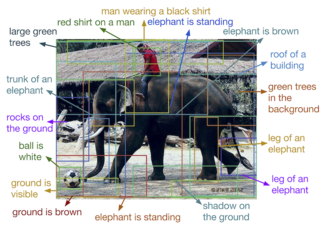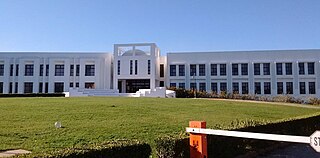Related Research Articles

Automatic image annotation is the process by which a computer system automatically assigns metadata in the form of captioning or keywords to a digital image. This application of computer vision techniques is used in image retrieval systems to organize and locate images of interest from a database.

The Foundation for Research & Technology – Hellas (FORTH) is a research center in Greece, supervised by the Ministry for Education through its General Secretariat for Research and Technology. It consists of nine research institutes, which are located in various cities of Greece: Heraklion, Rethymno, Patras, Ioannina and Chania. The foundation’s headquarters, as well as the central administration offices are located in Heraklion, Crete.
In computer vision, the bag-of-words model sometimes called bag-of-visual-words model can be applied to image classification or retrieval, by treating image features as words. In document classification, a bag of words is a sparse vector of occurrence counts of words; that is, a sparse histogram over the vocabulary. In computer vision, a bag of visual words is a vector of occurrence counts of a vocabulary of local image features.
Andrew Zisserman is a British computer scientist and a professor at the University of Oxford, and a researcher in computer vision. As of 2014 he is affiliated with DeepMind.
The International Conference on Computer Vision (ICCV) is a research conference sponsored by the Institute of Electrical and Electronics Engineers (IEEE) held every other year. It is considered to be one of the top conferences in computer vision, alongside CVPR and ECCV, and it is held on years in which ECCV is not.
The Conference on Computer Vision and Pattern Recognition (CVPR) is an annual conference on computer vision and pattern recognition, which is regarded as one of the most important conferences in its field. According to Google Scholar Metrics (2022), it is the highest impact computing venue.

Kentaro Toyama is a computer scientist and international development researcher, who works on the relationship of technology and global development. He is the W. K. Kellogg Professor at the University of Michigan School of Information and author of Geek Heresy: Rescuing Social Change from the Cult of Technology.

Jitendra Malik is an Indian-American academic who is the Arthur J. Chick Professor of Electrical Engineering and Computer Sciences at the University of California, Berkeley. He is known for his research in computer vision.
Multilinear principal component analysis (MPCA) is a multilinear extension of principal component analysis (PCA) that is used to analyze M-way arrays, also informally referred to as "data tensors". M-way arrays may be modeled by linear tensor models, such as CANDECOMP/Parafac, or by multilinear tensor models, such as multilinear principal component analysis (MPCA) or multilinear independent component analysis (MICA). The origin of MPCA can be traced back to the tensor rank decomposition introduced by Frank Lauren Hitchcock in 1927; to the Tucker decomposition; and to Peter Kroonenberg's "3-mode PCA" work. In 2000, De Lathauwer et al. restated Tucker and Kroonenberg's work in clear and concise numerical computational terms in their SIAM paper entitled "Multilinear Singular Value Decomposition", (HOSVD) and in their paper "On the Best Rank-1 and Rank-(R1, R2, ..., RN ) Approximation of Higher-order Tensors".

Pietro Perona is an Italian-American educator and computer scientist. He is the Allan E. Puckett Professor of Electrical Engineering and Computation and Neural Systems at the California Institute of Technology and director of the National Science Foundation Engineering Research Center in Neuromorphic Systems Engineering. He is known for his research in computer vision and is the director of the Caltech Computational Vision Group.
Pushmeet Kohli is highly regarded Computer and Machine Learning scientist and at Google DeepMind where he holds the position of Vice President of research for the "Secure and Reliable AI" and "AI for Science and Sustainability". Before joining DeepMind, he was partner scientist and director of research at Microsoft Research and a post-doctoral fellow at the University of Cambridge. Kohli's research investigates applications of machine learning and computer vision. He has also made contributions in game theory, discrete algorithms and psychometrics.
Jason Joseph Corso is Co-Founder / CEO of the computer vision startup Voxel51 and a Professor of Robotics, Electrical Engineering and Computer Science at the University of Michigan.
Jiebo Luo is a Chinese-American computer scientist, the Albert Arendt Hopeman Professor of Engineering and Professor of Computer Science at the University of Rochester. He is interested in artificial intelligence, data science and computer vision.
Stefan Roth is a German computer scientist, professor of computer science and dean of the department of computer science of the Technische Universität Darmstadt. He heads the Visual Inference Lab.

Michael J. Black is an American-born computer scientist working in Tübingen, Germany. He is a founding director at the Max Planck Institute for Intelligent Systems where he leads the Perceiving Systems Department in research focused on computer vision, machine learning, and computer graphics. He is also an Honorary Professor at the University of Tübingen.
Michal Irani is a professor in the Department of Computer Science and Applied Mathematics at the Weizmann Institute of Science, Israel.
Sanja Fidler is an associate professor at the University of Toronto and Director of AI at Nvidia. She is also a co-founder of the Vector Institute, University of Toronto and Canada CIFAR AI Chair. Her research is in the areas of computer vision and artificial intelligence.
Jiaya Jia is a tenured professor of the Department of Computer Science and Engineering at The Chinese University of Hong Kong (CUHK). He is an IEEE Fellow, the associate editor-in-chief of one of IEEE’s flagship and premier journals- Transactions on Pattern Analysis and Machine Intelligence (TPAMI), as well as on the editorial board of International Journal of Computer Vision (IJCV).
Wang Gang, also known as Michael Wang, is an electrical and computer engineer and academic specializing in Artificial Intelligence and its application in autonomous driving. Wang has authored or co-authored more than 100 publications, cited over 28,000 times. His h-index is computed to be 72.

Philip Torr FREng, FRS, is a British scientist and a professor at the University of Oxford, and a researcher in machine learning and computer vision.
References
- ↑ Faugeras, Olivier, ed. (August 8, 1990). "Computer Vision - ECCV 90: First European Conference on Computer Vision. Antibes, France, April 23-27, 1990. Proceedings". Springer-Verlag – via www.springer.com.
- ↑ "IEEE Conference on Computer Vision and Pattern Recognition, CVPR - Google Scholar Metrics". scholar.google.com.
- ↑ "Australian Ranking of ICT Conferences". Archived from the original on April 9, 2013.
- ↑ "Scholar Metrics: Top Publications". Google Scholar.
- ↑ "Australian Ranking of ICT Conferences". Archived from the original on March 5, 2010.
- ↑ "Conference Ranks". www.conferenceranks.com.
- ↑ "ECCV 2010, 11th European Conference on Computer Vision - final program". projects.ics.forth.gr.
- ↑ "ECCV 2010, 11th European Conference on Computer Vision - statistics". projects.ics.forth.gr.
- ↑ "Computer Vision Awards – The Computer Vision Foundation". The Computer Vision Foundation – A non-profit organization that fosters and supports research in all aspects of computer vision. 2012-10-10. Retrieved 2021-12-29.
- 1 2 "Conferences – The Computer Vision Foundation". www.thecvf.com.
- ↑ "ECCV 2020 |".
- ↑ "ECCV 2018". ECCV 2018.
- ↑ "ECCV 2016 | October 8-16, 2016 | Amsterdam". www.eccv2016.org.
- ↑ "ECCV 2014 : European Conference on Computer Vision". www.wikicfp.com.
- ↑ "ECCV 2012 – European Conference on Computer Vision – Florence, Italy 2012". eccv2012.unifi.it.
- ↑ "ECCV 2010, 11th European Conference on Computer Vision - home". projects.ics.forth.gr.